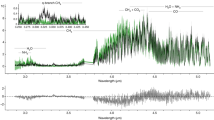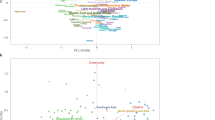Abstract
THE second virial coefficient of methane has been determined over a range of temperatures from 108° to 250° K. by means of an apparatus which is described elsewhere1.
This is a preview of subscription content, access via your institution
Access options
Subscribe to this journal
Receive 51 print issues and online access
$199.00 per year
only $3.90 per issue
Buy this article
- Purchase on Springer Link
- Instant access to full article PDF
Prices may be subject to local taxes which are calculated during checkout
Similar content being viewed by others
References
Thomaes, G., and Steenwinkel, R. Van, Rev. Sci. Instr. (in the press).
Armstrong, G. T., Brickwedde, F. C., and Scott, R. B., J. Res. Nat. Bur. Stand., 55, 39 (1955).
“Temperature. Its Measurement and Control in Science and Industry” (Reinhold Pub. Co., New York, 1941).
Michels, A., and Nederbragt, G. W., Physica, 2, 1000 (1935); 3, 569 (1936).
Author information
Authors and Affiliations
Rights and permissions
About this article
Cite this article
THOMAES, G., VAN STEENWINKEL, R. The Second Virial Coefficient of Methane at Low Temperature. Nature 187, 229–230 (1960). https://doi.org/10.1038/187229a0
Issue Date:
DOI: https://doi.org/10.1038/187229a0
This article is cited by
-
A Transformation Formula for Determining the Second Density Virial Coefficient from the Second Acoustic Virial Coefficient
International Journal of Thermophysics (2022)
-
Central potential for polyatomic molecules
Il Nuovo Cimento B Series 10 (1966)
-
Second Virial Coefficient of Krypton at Low Temperatures
Nature (1962)
Comments
By submitting a comment you agree to abide by our Terms and Community Guidelines. If you find something abusive or that does not comply with our terms or guidelines please flag it as inappropriate.



